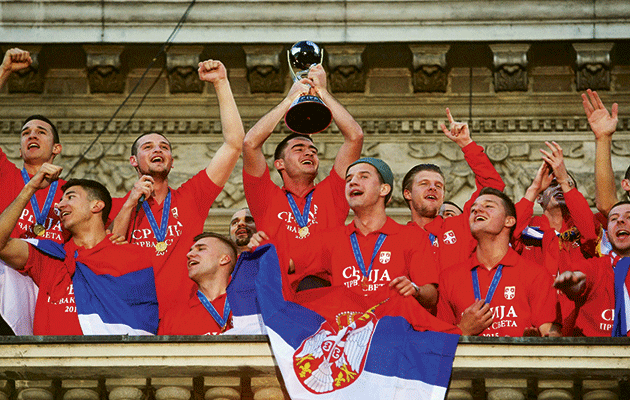Following Serbia’s triumph at the Under-20 World Cup in New Zealand, a crowd of 50,000 turned out in Belgrade to welcome home the country’s triumphant youngsters.
On one of the banners hanging from the front of City Hall – which is more used to celebrating successes in basketball, water polo or volleyball – there was the inscription “Ima nade” (there is hope).
And while the euphoria of the under-20s may soon be over, there is a real hope that this will be the start of something great at senior level.
Much of that belief is not just down to the fact that the team won the junior world championship, but more about how they did it, battling to victory despite playing extra-time in all four of their games in the knockout stage.
Physical strength, power and stamina have never been particular virtues of Serbian football, but this generation are an exception. As midfielder Sergej Milinkovic-Savic said after the 2-1 victory in the Final against Brazil: “We showed German mentality in a Serbian way. We always played well in those extra 30 minutes. It’s not by chance that we eventually won in each of those games. Again we succeeded to show our strong mentality.
“Our persistence, desire for victory and motivation were on highest level. We never give up and we always reach our goal.”
Solid at the back, hard working and creative in midfield, the team demonstrated great tactical discipline and, despite lacking a top-class striker, they still managed to be an effective attacking force, scoring 10 goals in seven matches.
From captain and goalkeeper Predrag Rajkovic of Red Star Belgrade, through to the centre-backs Milos Veljkovic of Tottenham Hotspur and Vojvodina’s Srdjan Babic, and on to midfielders Nemanja Maksimovic of Astana in Kazakhstan and Milinkovic-Savic of Belgium’s Genk, there was a great team spirit on display with no noticeable weak link. And added to this was the talent of Partizan winger Andrija Zivkovic who is already being called a “Serbian Arjen Robben”.
But while all credit must go to the players, it is highly unlikely that any of this would have been possible without the guiding hand of 37-year-old coach Veljko Paunovic.
Ably assisted by his back-room staff, Paunovic left nothing to chance, setting up his side perfectly to combat whatever opposition they came up against. He has now worked with this set of players for the past three years and has built a tremendous relationship with players who have thrived on his outstanding motivational skills.
When he first started working with the group, he sat them down to watch a documentary about “the Chileans” – the Yugoslavia team of Boban, Suker, Mijatovic and Prosinecki that won the 1987 Under-20 World Cup in Chile.
“We gathered here [in the sports centre of Serbia’s FA in Stara Pazova, near Belgrade] for the first time three years ago,” said Paunovic on his return from this year’s tournament. “Forty players were here and we watched footage of the ‘Chileans’.
“I think that the most important thing was that the boys believed in it, that they respected each other and that they had a great desire to achieve their goal.
“I am proud of all players and I am proud that we crowned our work in the best possible way.”
With the senior team very unlikely to qualify for the European Championship next year – which
would be the third successive major tournament they have missed out on – and a disappointing showing at this summer’s Euro Under-21 finals, the under-20 side offers a glimmer of hope
for the future.
It was a year ago that Paunovic said that he is convinced Serbia’s national side will one day become European champions, claiming: “If Greece could do it,
I see no reason why Serbia cannot.”
With his charisma and optimism becoming contagious, Serbian fans are starting to believe that it is his “New Zealanders” who will fulfil that dream.
By Vladimir Novak








